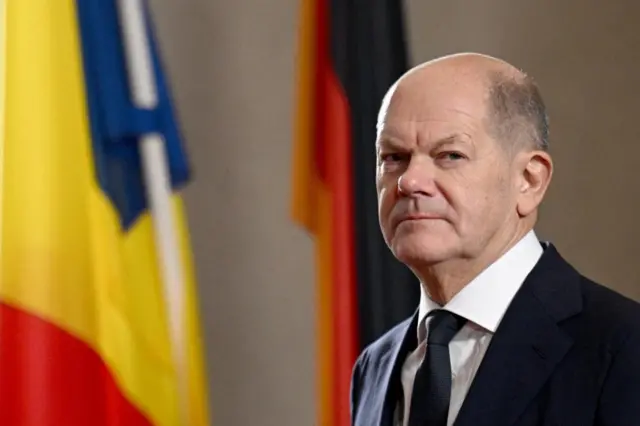Ukraine-Russia war latest: Russia vows response if Ukraine uses US long-range missiles to hit its territory

In Germany, Scholz tries to strike middle groundpublished at 16:44 Greenwich Mean Time 18 November 2024
Damien McGuinness
Berlin correspondent
 Image source, Reuters
Image source, ReutersArming Ukraine has been a hugely divisive political topic from the moment Russia launched its full invasion. Talk shows and parliamentary debates wrangle over each new type of German tank or missile sent, with politicians accusing each other of either escalation or appeasement.
Olaf Scholz tries to strike the middle ground, where most German voters seem to be: strong support for Ukraine, combined with an attempt to prevent the war spiralling out of control.
Scholz believes supplying the long-range Taurus cruise missile system could drag Germany into the war. His many critics say this fine distinction between individual weapons systems is illogical, especially since Germany is the largest donor of military aid after the US and is already seen as an aggressor by Putin.
But Scholz’s position may have more to do with domestic politics than military logic. He believes reticent non-bellicose rhetoric helps him keep German voters onside.
Scholz, who is struggling in the polls, now faces a snap election in February, and so is likely to double down. In previous campaigns he has portrayed himself as a “peace chancellor”, tapping into his centre-left party’s pacifist heritage.
Over the weekend, he was hugely criticised in Germany for his call to Putin, with critics accusing him of cynically using the issue for domestic political gain by trying to appear like a peacemaker.
But German politics are in flux. The opposition conservatives, who currently have a strong poll lead, want even more military support for Ukraine not less. So Germany’s stance on Taurus may yet change.
Related
What’s at stake for American culture with Trump’s Kennedy Center…
In her two decades as a human rights lawyer, working on issues in more than 25 countries, Hadar Harris says she is alarmed by what she's witnessing on U.S. soil
Denmark lost 52 soldiers fighting alongside the US. Now it…
Nick BeakeEurope correspondentBBCAll his adult life, Colonel Soren Knudsen stepped forward when his country called. And when its allies did.He fought alongside
As Trump upends foreign policy, Berkeley scholar sees irreparable damage…
Last week’s Oval Office blowup with Ukrainian President Volodymyr Zelensky exemplified what many foreign policy experts have long feared: that th
Trump creates a task force for the North American 2026…
President Donald Trump creates a task force to prepare for the 2026 W











